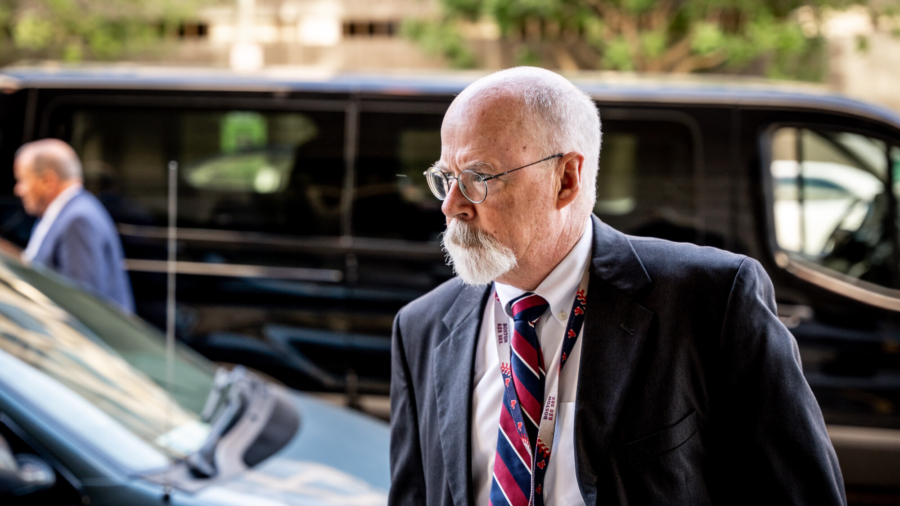Special counsel John Durham and his team cannot tell jurors about how the primary source for the anti-Donald Trump dossier has had links to Russian intelligence, a U.S. judge ruled on Oct. 4.
The FBI opened an investigation into Igor Danchenko, the dossier source, after a colleague of Danchenko’s tipped off authorities, saying Danchenko had said he could get the person money in exchange for classified information.
The FBI investigation advanced after agents learned that Danchenko had been in touch with the Russian embassy and known Russian intelligence officers and had in the past been interested in becoming a Russian intelligence officer himself. But the bureau closed the probe in 2010, claiming that Danchenko had left the country.
Danchenko later told agents, in 2017, that he had contact with multiple people he believed were Russian intelligence officers.
Durham’s team asked the court in September to let prosecutors discuss what the FBI learned during the investigation.
“The Government anticipates that a potential defense strategy at trial will be to argue that the defendant’s alleged lies about the sourcing of the Steele Reports were not material because they had no affect on, and could not have affected, the course of the FBI’s investigations concerning potential coordination or conspiracy between the Trump campaign and the Russian Government. Thus, the Government should be able to introduce evidence of this prior counterintelligence investigation (and that (sic) facts underlying that investigation) as direct evidence of the materiality of the defendant’s false statements,” prosecutors said at the time.
“Such evidence is admissible because in any investigation of potential collusion between the Russian Government and a political campaign, it is appropriate and necessary for the FBI to consider whether information it receives via foreign nationals may be a product of Russian intelligence efforts or disinformation.”
Defense lawyers said the fact that Danchenko was investigated by the FBI could be admitted but said prosecutors should not be able to use any of the details unearthed during the investigation.
In part, their argument rested on how the FBI hired Danchenko as a confidential human source in 2017 and continued paying him through 2020. The committee that reviewed Danchenko before his hiring knew of the prior investigation and the agents involved in the probe raised no objections to using Danchenko as a source, according to the defense. “As an initial matter, those facts obliterate the government’s argument that any alleged false statements were material to the government’s ability to evaluate whether Mr. Danchenko could have been working for the Russians all along,” they said.
U.S. District Judge Anthony Trenga, a George W. Bush appointee, sided with Danchenko.
“The probative value of these unproven allegations, i.e., Danchenko sought to facilitate the sale of classified information and that he had contact with Russian intelligence services, which would have to be established through multiple levels of hearsay, is of only marginal relevance in terms of proving the materiality of Danchenko’s allegedly false statements,” Trenga wrote in an order. “The evidence’s low probative value is substantially outweighed by the danger of unfair prejudice and confusion of the issues.”
Danchenko was charged with five counts of lying to the government. He allegedly lied about sourcing information from Sergei Millian, a businessman, and not sourcing information from Charles Dolan, a longtime Clinton family associate.

Rejects Many Other Proposals
Trenga also rejected many of the other proposals the government floated.
Durham wanted to admit statements Danchenko made about the salacious claim regarding Trump, Russian prostitutes, and the Ritz-Carlton hotel in Moscow. Danchenko conveyed the allegation to Christopher Steele, an ex-British spy who compiled the dossier for Hillary Clinton and other Democrats, in 2016. Danchenko allegedly told the FBI he spoke to hotel staff and management about the allegations.
Durham asked to call Bernd Kuhlen, a German citizen who was the only western member of the hotel management in 2016. Kuhlen would testify that he does not recall meeting with Danchenko and had no knowledge of the allegation.
Trenga denied both proposals, ruling that Danchenko’s statements regarding his sourcing do not qualify as direct evidence. He also said that Kuhlen’s testimony “bears little probative value in terms of materiality.” Further, Danchenko’s telling the FBI that Millian could be “Source D,” one of the people Steele credited, is being blocked from the trial for now, though the government can ask for reconsideration during the trial.
Trenga also said prosecutors cannot talk about Danchenko allegedly saying he never told friends or associates that he worked for Steele or Steele’s business, Orbis Business Intelligence. However, the government can introduce an email from Danchenko to Dolan that indicates he passed a letter to Steele for Dolan and planned to coordinate a meeting between Dolan and Steele.
And a message Danchenko sent to Cenk Sidar, a former boss, about fabricating sources cannot be admitted because it is “completely unrelated to the Steele reports,” the judge said.
The trial is due to start on Oct. 11.
From The Epoch Times

